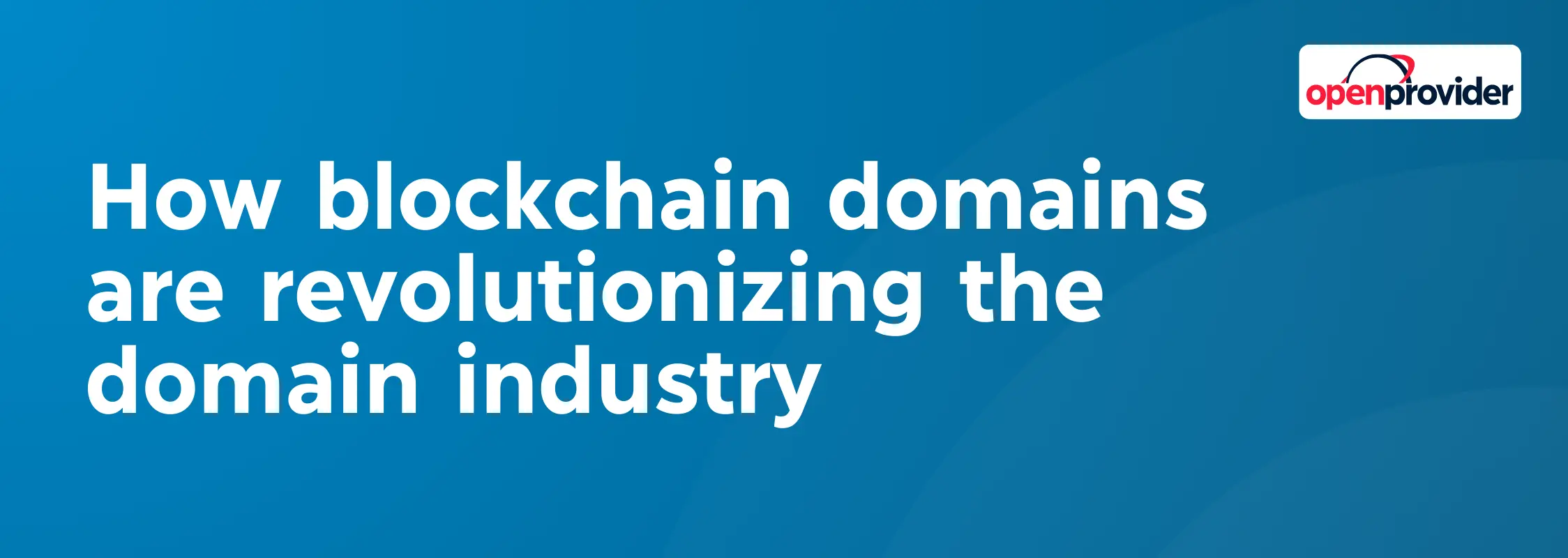The domain industry has long been built on a centralized foundation, with ICANN and registrars managing the registration and ownership of domains – but blockchain domains are shaking up this traditional model.
Offering a decentralized, innovative approach, they are transforming the way we think about digital identities and online ownership.
More than just a buzzword, blockchain domains like .crypto, .nft, .sol, .bitcoin, and .zil are rewriting the rules for the domain industry as a whole, creating opportunities and challenges for businesses, individuals, and resellers alike.
Are you a domain reseller or tech entrepreneur new to the world of blockchain domains?
This article tells you all you need to know to adapt insights and knowledge from the blockchain world to your “traditional” domain reseller business.
What are blockchain domains?
Unlike traditional domains, which require ongoing renewals and are managed by centralized authorities, blockchain domains operate on decentralized systems like the Ethereum or Zilliqa blockchain. This means owners truly control their domains, with no intermediary able to revoke or censor them.
Blockchain domains are minted as non-fungible tokens (NFTs), allowing users to buy, sell, and transfer ownership directly on the blockchain. There are no renewal fees, and blockchain domains cannot expire.
This shift to decentralization empowers users with a sense of permanence and autonomy. For the first time, domain ownership can exist independently of external organizations, offering a new level of security and freedom that challenges traditional domain practices.
Blockchain domains as digital identities
Blockchain domains are not just domains. Even more so than regular domain names and websites, they’re tools for creating digital identities.
By replacing long, unreadable blockchain wallet addresses with human-friendly names (e.g., “john.crypto”), blockchain domains simplify cryptocurrency transactions and make blockchain technology more accessible to everyday users.
Beyond payments, blockchain domains serve as digital passports for Web3. They can link to decentralized applications (dApps), NFTs, and social profiles, providing a unified online identity for individuals and businesses in the decentralized world.
For brands venturing into Web3, blockchain domains are a unique way to establish a presence and build trust in emerging digital spaces.
Blockchain domains and censorship
One of the most revolutionary aspects of blockchain domains is their role in enabling censorship-resistant websites. Traditional domains are subject to removal or suspension by governing bodies, but blockchain domains are hosted on decentralized networks like IPFS (InterPlanetary File System). This makes it nearly impossible for a third party to take down a website.
For businesses, activists, and journalists operating in restrictive environments, blockchain domains are a powerful tool for preserving free speech and ensuring uninterrupted access to information. While still in its early stages, this potential use case ensures greater freedom for businesses in restrictive environments.
Popular blockchain domains
Unlike traditional domains, there are no official statistics on the most popular blockchain domains. .eth, connected to the Ethereum blockchain, is arguably one of the most registered ones, and one that has frequently made headlines in domain industry publications due to the mind-blowing prices these domains can sell for on the aftermarket.
Other well-known blockchain domains include:
- .x
- .crypto
- .nft
- .wallet
- .dao
- .ggg
- .go
- .zil
- .coin
- .bitcoin
- .u
Unstoppable Domains: leading the way
With 4M+ domains under management, Unstoppable Domains is the largest registrar in the blockchain domain industry – and one that is actively disrupting the traditional domain industry too, due to the ways they blend traditional and crypto domains in their offer.
Besides offering both traditional and blockchain domains through one platform, Unstoppable Domains is bridging Web2 and Web3 by introducing browser extensions and collaborating with leading web browsers to make accessing decentralized content effortless.
At the same time, they’re putting true ownership in the hands of their users. Unlike traditional marketplaces like Sedo and Afternic, Unstoppable Domains’ marketplace feature allows customers to negotiate directly with each other. Eliminating the need for a broker, this model redefines how traditional domain names are bought and sold.
Challenges and opportunities for the domain industry
Like any disruptive technology, blockchain domains come with their share of challenges. Regulatory uncertainties and the lack of universal browser support can hinder adoption, while many users are still unfamiliar and possibly uncomfortable with the concept of decentralized domains. Not everyone in the traditional domain industry is convinced of their potential either, including big names like Andrew Allemann and Raymond Hackney.
However, these challenges are matched by exciting opportunities for those willing to take the risk.
Resellers and registrars can position themselves as pioneers in this emerging space by:
- Educating customers about the benefits and practical uses of blockchain domains.
- Diversifying their portfolios to include blockchain domain offerings alongside traditional options.
- Building bridges between Web2 and Web3 by supporting hybrid models where traditional domains can point to decentralized content.
In an era of increased monopolization and competition in the domain name sphere, this is one way to capture a new segment of customers and future-proof their offerings.
Conclusion
Blockchain domains are more than a trend; they’re a catalyst for change in the domain industry.
By challenging traditional ownership models, enabling censorship-resistant websites, and driving innovation, they’re transforming how we think about digital identities and online presence.
For businesses and resellers alike, the time to explore blockchain domains is now. Whether you’re looking to educate your customers, diversify your offerings, or simply stay ahead of the curve, blockchain domains offer a glimpse into the future of the domain industry – one where decentralization and innovation take center stage.


